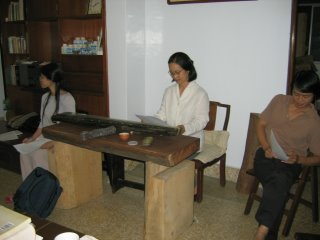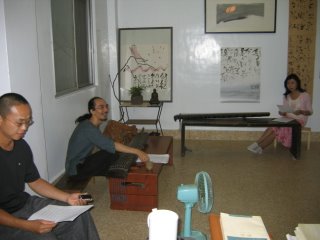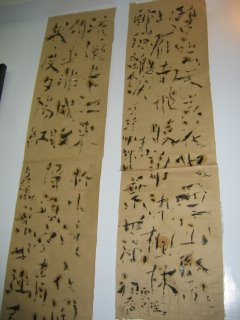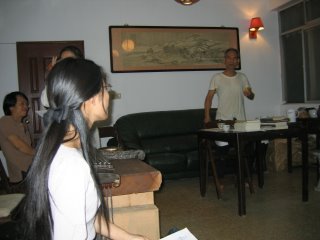 Miss Zhuang Xiu-zhen (in the middle) and Mr. Liu Fu-jing at her left.
I heard several people's qin playing. Xing-yi played Yu Ge 漁歌 that he dapu from Wu Zhi-zhai Qinpu 五知齋琴譜. Xing-yi learned qin from Master Zhuang Xiu-zhen for 2 years and had been playing qin for 5 years. Mr. Pan commented that Xing-yi's Yu Ge is very 悲愴 (tragic) like the sorrow of swan lake. Xing-yi's shixong, Mr. Liu Fu-jing 劉富錦 played Wu Ye Wu Qiu Feng 梧葉舞秋風, very impressive. Mr. Liu learned qin from Master Zhuang the longest. He is also master in qin making. Currently Mr. Liu is supervising several qin makers in Mainland China. Master Zhuang Xiu-zhen played the Ping Sha Luo Yan which was taught by Master Sun Yu-qin. Mr. Pan gave very high appreciation of her playing of the Pin Sha Luo Yan.
Chinese art and the Chinese art environment cannot be separated, such as when to listen rain? When to play guqin? etc,. It has to be in a certain situation to do certain thing in order to be beautiful. Each two of the grades of poetry is corresponding to each other. Xiong Hun is corresponding to Chong Dan. Xian Nong 纖穠 is corresponding to Chen Zhuo 沉著 and so on and so forth. Each two phrases of each grade is also corresponding to each other. Such as the first two phrases of the first grade, 大用外腓 is based on 真體內充, meaning that the great graceful appearance is based on the true inner richness. Another two phrases, 反虛入渾 積健為雄, meaning that it has to be in a big space in order to enter the original inner truth. And the powerful energy comes from accumulating exercise. And the last four phrases of the first grade, 超以象外 得其環中, 持之非強 來之無窮 meaning that crossing over the limitation, a living thing will live forever without the limitation of time. When holding it, you don't feel it is strong but you will feel the power later when you hold it longer and longer. After Mr. Pan's explanation of the first grade, I just realized how rich the Chinese literature is.  On the wall, there are the paintings and calligraphy by Mr. Ye Shi-qian. Mr. Liu Xing-yi is the one in the middle. 二十四詩品 Twenty-four Grades of Poetry 作者:舊題晚唐.司空圖(837--908)(Mr. Pan believes that it was not written by Si Kong Tu in Tang Dynasty, it was written in Yuang or Ming Dynasty.) 一、雄渾 大用外腓,真體內充。返虛入渾,積健為雄。具備萬物,橫絕太空。 荒荒油雲,寥寥長風。超以象外,得其環中。持之非強,來之無窮。 二、沖淡 素處以默,妙機其微。飲之太和,獨鶴與飛。猶之惠風,荏苒在衣。 閱音修篁,美曰載歸。遇之匪深,即之愈希。脫有形似,握手已違。 三、纖穠 采采流水,蓬蓬遠春。窈窕深谷,時見美人。碧桃滿樹,風日水濱。 柳陰路曲,流鶯比鄰。乘之愈往,識之愈真。如將不盡,與古為新。 四、沈著 綠林野屋,落日氣清。脫巾獨步,時聞鳥聲。鴻雁不來,之子遠行。 所思不遠,若為平生。海風碧雲,夜渚月明。如有佳話,大河前橫。 五、高古 畸人乘真,手把芙蓉。汎彼浩劫,窅然空蹤。月出東斗,好風相從。 太華夜碧,人聞清鐘。虛佇神素,脫然畦封。黃唐在獨,落落玄宗。 六、典雅 玉壺買春,賞雨茆屋。坐中佳士,左右修竹。白雲初晴,幽鳥相逐。 眠琴綠陰,上有飛瀑。落花無言,人淡如菊。書之歲華,其曰可讀。 七、洗鍊 如(金廣)出金,如鉛出銀。超心鍊冶,絕愛緇磷。空潭瀉春,古鏡照神。 體素儲潔,乘月返真。載瞻星氣,載歌幽人。流水今日,明月前身。 八、勁健 行神如空,行氣如虹。巫峽千尋,走雲連風。飲真茹強,蓄素守中。 喻彼行健,是謂存雄。天地與立,神化攸同。期之以實,御之以終。 九、綺麗 神存富貴,始輕黃金。濃盡必枯,淡者屢深。霧餘水畔,紅杏在林。 月明華屋,畫橋碧陰。金尊酒滿,伴客彈琴。取之自足,良殫美襟。 一○、自然 俯拾即是,不取諸鄰。俱道適往,著手成春。如逢花開,如瞻歲新。 真與不奪,強得易貧。幽人空山,過雨採蘋。薄言情悟,悠悠天鈞。 一一、含蓄 不著一字,盡得風流。語不涉己,若不堪憂。是有真宰,與之沉浮。 如淥滿酒,花時返秋。悠悠空塵,忽忽海漚。淺深聚散,萬取一收。 一二、豪放 觀花匪禁,吞吐大荒。由道返氣,處得以狂。天風浪浪,海山蒼蒼。 真力彌滿,萬象在旁。前招三辰,後引鳳凰。曉策六鼇,濯足扶桑。 一三、精神 欲返不盡,相期與來。明漪絕底,奇花初胎。青春鸚鵡,楊柳樓臺。 碧山人來,清酒深杯。生氣遠出,不著死灰。妙造自然,伊誰與裁? 一四、縝密 是有真跡,如不可知。意象欲出,造化已奇。水流花開,清露未晞。 要路愈遠,幽行為遲。語不欲犯,思不欲癡。猶春於綠,明月雪時。 一五、疏野 惟性所宅,真取弗羈。控物自富,與率為期。築室松下,脫帽看詩。 但知旦暮,不辨何時?倘然適意,豈必有為!若其天放,如是得之。 一六、清奇 娟娟群松,下有漪流。晴雪滿汀,隔溪漁舟。可人如玉,步屧尋幽。 載瞻載止,空碧悠悠。神出古異,澹不可收。如月之曙,如氣之秋。 一七、委曲 登彼太行,翠遶羊腸。杳藹流玉,悠悠花香。力之於時,聲之於羌。 似往已迴,如幽匪藏。水理漩洑,鵬風翱翔。道不自器,與之圓方。 一八、實境 取語甚直,計思匪深。忽逢幽人,如見道心。清澗之曲,碧松之陰。 一客荷樵,一客聽琴。情性所至,妙不自尋。遇之自天,泠然希音。 一九、悲慨 大風捲水,林木為摧。適苦欲死,招憩不來。百歲如流,富貴冷灰。 大道日喪,若為雄才?壯士拂劍,浩然彌哀。蕭蕭落葉,漏雨蒼苔。 二○、形容 絕佇靈素,少迴清真。如覓水影,如寫陽春。風雲變態,花草精神。 海之波瀾,山之嶙峋。俱似大道,妙契同塵。離形得似,庶幾斯人。 二一、超詣 匪神之靈,匪機之微。如將白雲,清風與歸。遠引若至,臨之已非。 少有道氣,終與俗違。亂山喬木,碧苔芳暉。誦之思之,其聲愈希。 二二、飄逸 落落欲往,矯矯不群。緱山之鶴,華頂之雲。高人惠中,令色絪縕。 御風蓬葉,汎彼無垠。如不可執,如將有聞。識者期之,欲得愈分。 二三、曠達 生者百歲,相去幾何?歡樂苦短,憂愁實多。如何尊酒,日往煙蘿。 花覆茆簷,疏雨相過。倒酒既盡,杖藜行歌。孰不有古?南山峨峨。 二四、流動 若納水(車官),如轉丸珠。夫豈可道?假體如愚。荒荒坤軸,悠悠天樞。 載要其端,載聞其符。超超神明,返返冥無。來往千載,是之謂乎? | ||||||
Back To Main Menu | Back To Previous Page | ||||||

